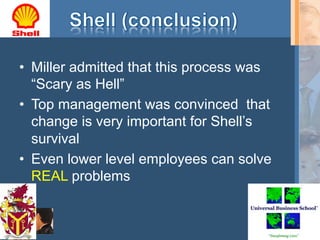Management Of Change
- 1. Slocum / Hellriegel By:- Sai Kiran Mimani CMBA2 / 1321
- 3. Change  Purpose  Leadership  Focus  Mo4va4on  ProïŽt  Incen4ve  Strategy   Top  Down Â
- 4. Change  Reward  System  Organiza4onal   System  Leadership  Teams  Individual  Organiza4onal  Design Â
- 6. âĒâŊ Two year after start. âĒâŊ The company fell down âĒâŊ All the senior manager had to attain workshops âĒâŊ Performance improved but moral was still the same
- 7. âĒâŊ Shell had to be more aggressive in the internet stage âĒâŊ It couldnât agree on how to implement âĒâŊ SO IT MADE EFFORT TO CHANGE âĒâŊ Steve Miller, started to make the change but to change the top level manager he would like to change their behavior
- 8. âĒâŊ Miller started working half of his time with employees âĒâŊ He started meeting the employees of 25 different countries âĒâŊ The main challenge faced by Miller was how to boot 49000 Gas Station in retail sales
- 9. âĒâŊ He started âRetail Boot Campâ for five days âĒâŊ Before going home he went to âThe Campâ and then developed a new business plan âĒâŊ He later on received feedback from other shell employees
- 10. âĒâŊ After two months they returned to âThe Campâ for follow up session that focused on what had worked and what had failed âĒâŊ Employees of the company had the chance to developed the company âĒâŊ Worker though the top level that change could happen
- 11. âĒâŊ Miller admitted that this process was âScary as Hellâ âĒâŊ Top management was convinced that change is very important for Shellâs survival âĒâŊ Even lower level employees can solve REAL problems
- 12. Resistance  To  Change  âĒâŊ Perception âĒâŊ Personality âĒâŊ Habit âĒâŊ Threats to power and influence âĒâŊ Fear of the unknown âĒâŊ Economic reasons âĒâŊ Organizational design âĒâŊ Organizational culture âĒâŊ Resource limitation âĒâŊ Fixed investment âĒâŊ Inter-organizational agreements Individual  Organiza4on Â












